
The Broadway Melody, also known as The Broadway Melody of 1929, is a 1929 American pre-Code musical film and the first sound film to win an Academy Award for Best Picture. It was one of the early musicals to feature a Technicolor sequence, which sparked the trend of color being used in a flurry of musicals that would hit the screens in 1929–1930. Today, the Technicolor sequence survives only in black and white. The film was the first musical released by Metro-Goldwyn-Mayer and was Hollywood's first all-talking musical.
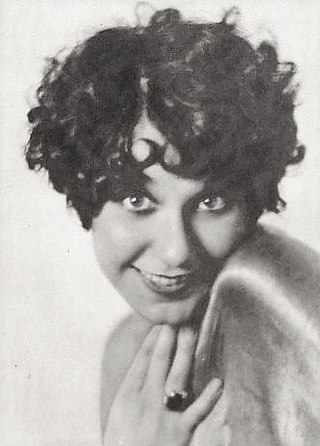
Fifi D'Orsay was a Canadian-American actress and singer.
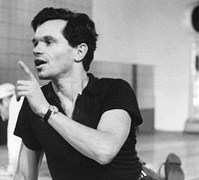
Michael Kidd was an American film and stage choreographer, dancer and actor, whose career spanned five decades, and who staged some of the leading Broadway and film musicals of the 1940s and 1950s. Kidd, strongly influenced by Charlie Chaplin and Léonide Massine, was an innovator in what came to be known as the "integrated musical", in which dance movements are integral to the plot.

Mack & Mabel is a musical with a book by Michael Stewart and music and lyrics by Jerry Herman. The plot involves the tumultuous romantic relationship between Hollywood director Mack Sennett and Mabel Normand, who became one of his biggest stars. In a series of flashbacks, Sennett relates the glory days of Keystone Studios from 1911, when he discovered Normand and cast her in dozens of his early "two-reelers", through his creation of Sennett's Bathing Beauties and the Keystone Cops to Mabel's death from tuberculosis in 1930.

An American in Paris is a 1951 American musical romantic comedy film inspired by the 1928 jazz-influenced symphonic poem An American in Paris by George Gershwin. Starring Gene Kelly, Leslie Caron, Oscar Levant, Georges Guétary, and Nina Foch, the film is set in Paris, and was directed by Vincente Minnelli from a script by Alan Jay Lerner. The music is by George Gershwin, with lyrics by his brother Ira, with additional music by Johnny Green, and Saul Chaplin, the music directors.
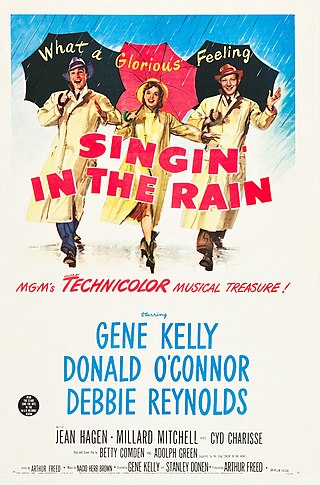
Singin' in the Rain is a 1952 American musical romantic comedy film directed and choreographed by Gene Kelly and Stanley Donen, starring Kelly, Donald O'Connor and Debbie Reynolds, and featuring Jean Hagen, Millard Mitchell, Rita Moreno and Cyd Charisse in supporting roles. It offers a lighthearted depiction of Hollywood in the late 1920s, with the three stars portraying performers caught up in the transition from silent films to "talkies".
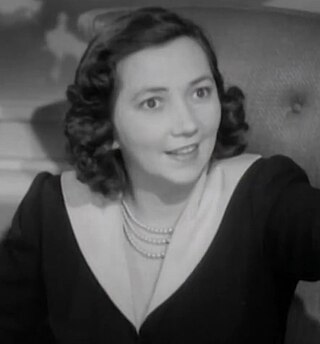
Patsy Kelly was an American actress. She is known for her role as the brash, wisecracking sidekick to Thelma Todd in a series of short comedy films produced by Hal Roach in the 1930s. Kelly's career continued in similar roles after Todd's death in 1935.
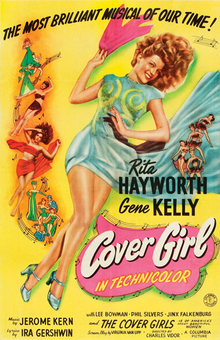
Cover Girl is a 1944 American musical romantic comedy film directed by Charles Vidor, and starring Rita Hayworth and Gene Kelly. The film tells the story of a chorus girl given a chance at stardom when she is offered an opportunity to be a highly paid cover girl. It was one of the most popular musicals of the war years.
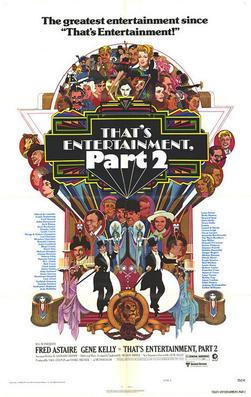
That's Entertainment, Part II is a 1976 American compilation film released by Metro-Goldwyn-Mayer and a sequel to That's Entertainment! (1974). Like the previous film, That's Entertainment, Part II was a retrospective of famous films released by MGM from the 1930s to the 1950s. Some posters for the film use Part 2 rather than Part II in the title.
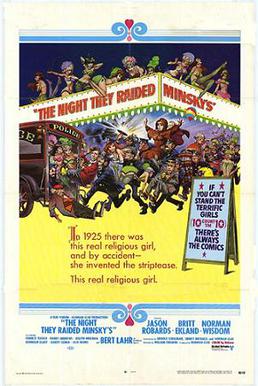
The Night They Raided Minsky's is a 1968 American musical comedy film written and produced by Norman Lear, with music and lyrics by the duo of Charles Strouse and Lee Adams, and directed by William Friedkin. Based on a 1960 novel by Rowland Barber, the film is a fictional account of the invention of the striptease at Minsky's Burlesque in 1925. It stars Jason Robards, Britt Ekland, Norman Wisdom, Forrest Tucker, Harry Andrews, Denholm Elliott, Elliott Gould and Bert Lahr.
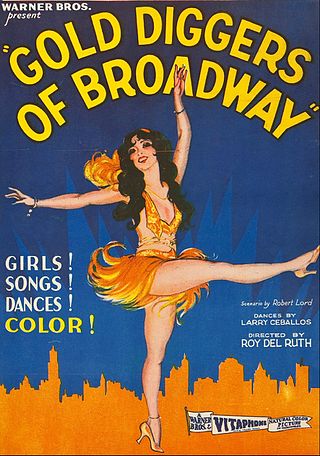
Gold Diggers of Broadway is a 1929 American pre-Code musical comedy film directed by Roy Del Ruth and starring Winnie Lightner and Nick Lucas. Distributed by Warner Bros., the film is the second all-talking, all-Technicolor feature-length film.

The Show of Shows is a 1929 American pre-Code musical revue film directed by John G. Adolfi and distributed by Warner Bros. The all-talking Vitaphone production cost almost $800,000 and was shot almost entirely in Technicolor.
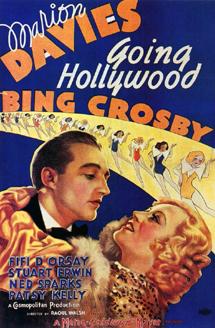
Going Hollywood is a 1933 American pre-Code musical film directed by Raoul Walsh and starring Marion Davies and Bing Crosby. It was written by Donald Ogden Stewart and based on a story by Frances Marion. Going Hollywood was released by Metro-Goldwyn-Mayer on December 22, 1933.

Kiss Me Again is a 1931 American pre-Code musical operetta film filmed entirely in Technicolor. It was originally released in the United States as Toast of the Legion late in 1930, but was quickly withdrawn when Warner Bros. realized that the public had grown weary of musicals. The Warner Bros. believed that this attitude would only last for a few months, but, when the public proved obstinate, they reluctantly re-released the film early in 1931 after making a few cuts to the film.

Paris is a 1929 American pre-Code musical comedy film, featuring Irène Bordoni. It was filmed with Technicolor sequences: four of the film's ten reels were originally photographed in Technicolor.
Caitlynne Medrek is an international, award winning Canadian actress. She spent the first half of her career living and working in professional theatre around Canada, but has since set her sights on creating a cinematic career by performing in Film and Television. A Canadian College of Performing Arts alumna, Medrek is a true triple threat. She is best known for her roles in Heartland as Ms. Clarissa, Fargo, Season 3 as Grace Stussy, and Claire in the award-winning series, Out with Dad. She has had an incredible voice acting career with notable roles like Dawn in Total Drama: Revenge of the Island, Mikoto in My-HiME, Miu Matsuoka in Strawberry Marshmallow, and Pan in Dragon Ball GT. Her latest mainstream voice work include: The Haunted House: The Secret of the Ghost Ball (Netflix), Kongsuni (Netflix), Cardfight!! Vanguard, Arthur, and Gintama. She can be seen in the final season of Hell on Wheels, Season 2 of Wynonna Earp, Season 3 of Fargo as Grace Stussy, Season 3 of The Detour and recently, Seasons 15 and 16 of Heartland, Season 2 of Tribal and Season 2 of Yellowjackets. Caitlynne is also in production for two Feature Films set for 2023 release.
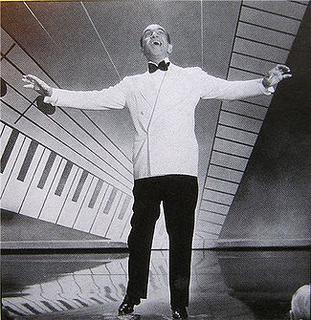
Wonder Bar is a 1934 American pre-Code film adaptation of a Broadway musical of the same name directed by Lloyd Bacon with musical numbers created by Busby Berkeley.

Sweet Charity is a 1969 American musical comedy-drama film directed and choreographed by Bob Fosse in his feature directorial debut, written by Peter Stone, and featuring music by Cy Coleman and Dorothy Fields.

Copacabana is a 1947 American musical comedy film directed by Alfred E. Green starring Carmen Miranda, Groucho Marx and Steve Cochran. The film is a showcase for Miranda, who performs several numbers in her usual style, including a high-energy rendition of "Tico-Tico". Groucho, as Lionel, her fiance and agent, also sings a musical number, "Go West, Young Man", wearing his traditional greasepaint brows, mustache, and baggy suit. This was Groucho's first significant film appearance as a solo act, minus Harpo and Chico.

Sally is a 1925 American silent romantic comedy film starring Colleen Moore. The film was directed by Alfred E. Green, produced by Moore's husband John McCormick, and based on the musical Sally written by Guy Bolton and Clifford Grey that was adapted to film by June Mathis. The play was a Florenz Ziegfeld Jr. production written specifically for Marilyn Miller that opened on December 21, 1920, at the New Amsterdam Theatre on Broadway. It ran for 570 performances.



















